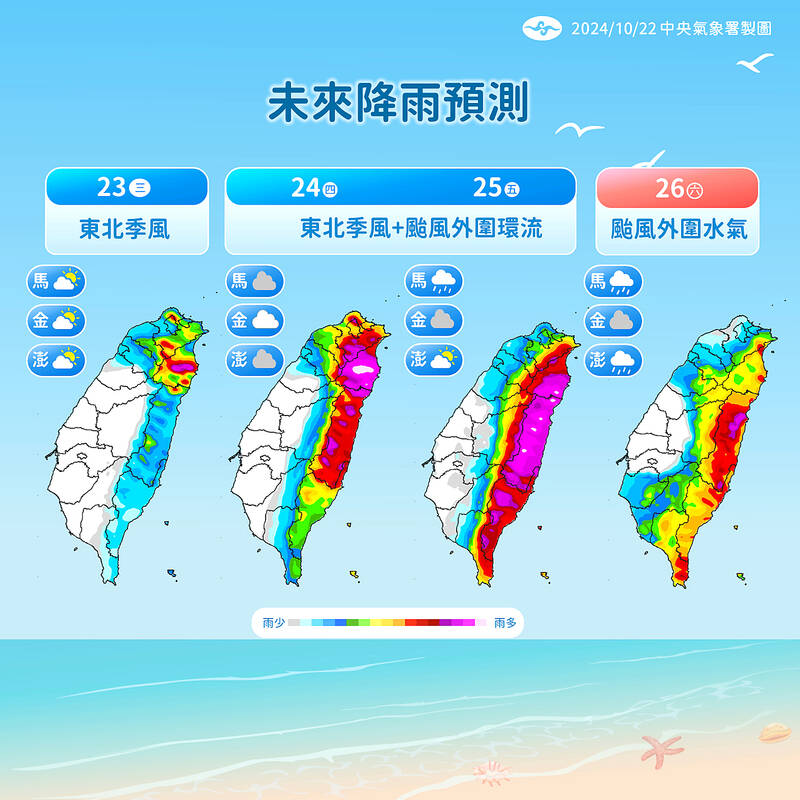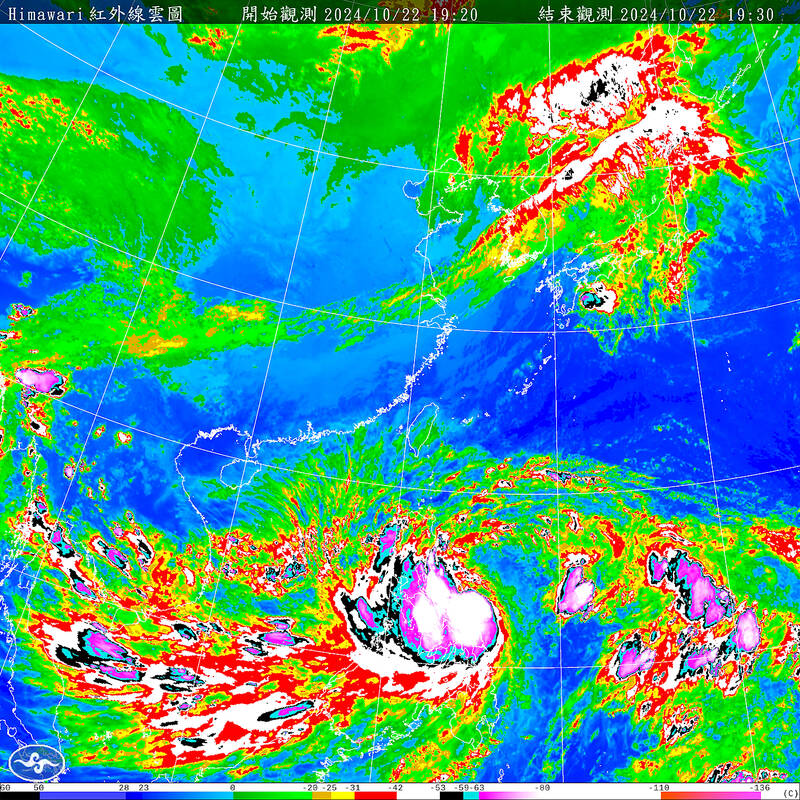A tropical depression east of the Philippines became a tropical storm named Trami at 2am yesterday, and is projected to move west-northwest toward waters east of Luzon Island, the Central Weather Administration (CWA) said.
As of 8am, Trami’s center was 700km east of Manila, or 1,180km southeast of Oluanpi (鵝鑾鼻), Taiwan’s southernmost tip, moving in a northwesterly direction.
It was carrying maximum sustained winds of 65kph, with gusts of up to 90kph, CWA data showed.

Photo courtesy of the Central Weather Administration
The weather agency forecast the center of the storm would be over waters 470km east-northeast of Manila or 820km southeast of Oluanpi at 8am today, and urged ships sailing in the Bashi Channel and east of the Philippines to closely watch Trami’s movements.
Independent meteorologist Daniel Wu (吳德榮) did not expect the storm to have a direct impact on Taiwan, and said Trami’s core structure was loose and unlikely to intensify into a typhoon.
Yet while the probability of a direct hit on Taiwan had fallen below 8 percent, the storm could bring significant rainfall to eastern Taiwan because of its size, he said yesterday.

Photo: screen grab from the Central Weather Administration Web site
Trami’s peripheral winds are set to bring rainfall in Taiwan’s northern and eastern areas, the CWA said.
The agency is highly unlikely to issue land or sea warnings for the storm, but Trami’s radius is expected to grow to 280km this afternoon, increasing the risk of torrential rain and related effects in northern Taiwan as well as Yilan and Hualien counties over the following two days, CWA forecaster Huang En-hung (黃恩鴻) said.
Additional reporting by Lin Chih-yi

Intelligence agents have recorded 510,000 instances of “controversial information” being spread online by the Chinese Communist Party (CCP) so far this year, the National Security Bureau (NSB) said in a report yesterday, as it warned of artificial intelligence (AI) being employed to generate destabilizing misinformation. The bureau submitted a written report to the Legislative Yuan in preparation for National Security Bureau Director-General Tsai Ming-yen’s (蔡明彥) appearance before the Foreign Affairs and National Defense Committee today. The CCP has been using cognitive warfare to divide Taiwanese society by commenting on controversial issues such as Taiwan Semiconductor Manufacturing Co’s (TSMC, 台積電) investments in the

INVESTIGATION: The case is the latest instance of a DPP figure being implicated in an espionage network accused of allegedly leaking information to Chinese intelligence Democratic Progressive Party (DPP) member Ho Jen-chieh (何仁傑) was detained and held incommunicado yesterday on suspicion of spying for China during his tenure as assistant to then-minister of foreign affairs Joseph Wu (吳釗燮). The Taipei District Prosecutors’ Office said Ho was implicated during its investigation into alleged spying activities by former Presidential Office consultant Wu Shang-yu (吳尚雨). Prosecutors said there is reason to believe Ho breached the National Security Act (國家安全法) by leaking classified Ministry of Foreign Affairs information to Chinese intelligence. Following interrogation, prosecutors petitioned the Taipei District Court to detain Ho, citing concerns over potential collusion or tampering of evidence. The

‘COMPREHENSIVE PLAN’: Lin Chia-lung said that the government was ready to talk about a variety of issues, including investment in and purchases from the US The National Stabilization Fund (NSF) yesterday announced that it would step in to staunch stock market losses for the ninth time in the nation’s history. An NSF board meeting, originally scheduled for Monday next week, was moved to yesterday after stocks plummeted in the wake of US President Donald Trump’s announcement of 32 percent tariffs on Taiwan on Wednesday last week. Board members voted to support the stock market with the NT$500 billion (US$15.15 billion) fund, with injections of funds to begin as soon as today. The NSF in 2000 injected NT$120 billion to stabilize stocks, the most ever. The lowest amount it

NEGOTIATIONS: Taiwan has good relations with Washington and the outlook for the negotiations looks promising, Minister of Economic Affairs J.W. Kuo said Taiwan’s GDP growth this year is expected to decrease by 0.43 to 1.61 percentage points due to the effects of US tariffs, National Development Council (NDC) Minister Paul Liu (劉鏡清) said at a meeting of the legislature’s Economics Committee in Taipei yesterday, citing a preliminary estimate by a private research institution. Taiwan’s economy would be significantly affected by the 32 percent “reciprocal” tariffs slapped by the US, which took effect yesterday, Liu said, adding that GDP growth could fall below 3 percent and potentially even dip below 2 percent to 1.53 percent this year. The council has commissioned another institution